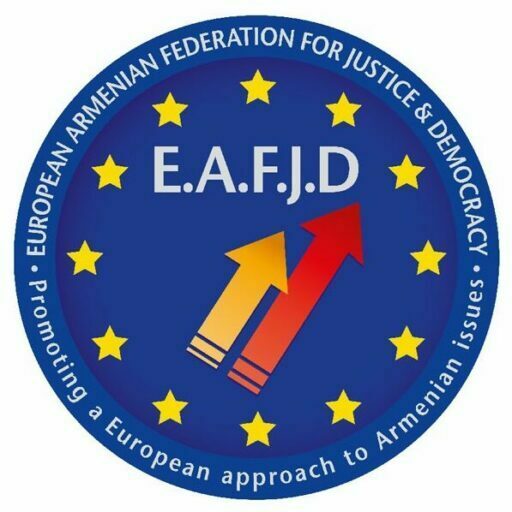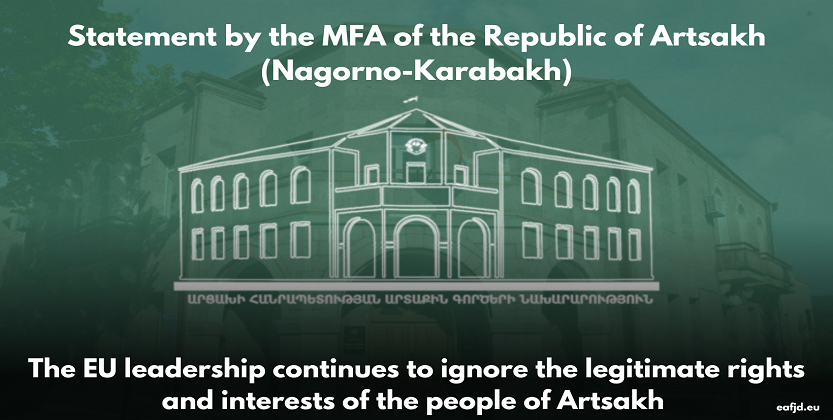On 14 May, President of the European Council Charles Michel made a press statement following a trilateral meeting with Armenian Prime Minister Nikol Pashinyan and Azerbaijani President Ilham Aliyev. The content of the statement as a whole, as well as a number of points contained there indicate that the EU leadership continues to ignore the legitimate rights and interests of the people of Artsakh and is guided solely by their own geopolitical and short-term interests in the region to the detriment of the values of democracy and human rights declared by the European Union.
This is evidenced in particular by the absence in the statement of any mention of more than 5-months blockade of the Lachin Corridor, the establishment of an illegal Azerbaijani checkpoint at the entrance to the corridor and the factual siege of the 120,000 population of Artsakh with all the ensuing humanitarian consequences. This is an indication of the fact that the President of the European Council not only does not prevent, but in fact indulges Azerbaijan in using the suffering of the people of Artsakh as a political tool.
However, if the intentions and visible actions of Azerbaijan to provoke a humanitarian catastrophe and carry out ethnic cleansing in Artsakh are not a matter of concern for the President of the European Council, we still had the right to expect that the organisation he represents would show direct interest in Azerbaijan’s strict compliance with the decisions of the European Court of Human Rights and the International Court of Justice, as one of the pillars of contemporary international legal order. In this regard, the European Council President’s defiant disregard for Azerbaijan’s consistent non-compliance with the legally binding Order of the principal judicial organ of the UN and its systematic violations of international law, in particular the non-use or threat of force and the peaceful settlement of disputes, is puzzling.
It is only the effective measures on the part of the international community aimed at forcing Azerbaijan to immediately and unconditionally implement its obligations under the Trilateral Statement of 9 November 2020 and the Order of the International Court of Justice of 22 February 2023, that may testify that those acting as mediators are sincerely interested in lasting peace and stability in the region. We believe that those international actors who either by their action or inaction are encouraging Baku in their aggressive, expansionist policies and internationally wrongful acts, not only bear responsibility for their grave consequences, but also justify the recurrence of such policies and violations in other parts of the world.
We recall once again that in 1991, the people of Artsakh, in full compliance with international law and domestic legislation in force at that time, exercised their inalienable right to self-determination and established their statehood on the same basis as Azerbaijan and Armenia. The authorities of the Republic of Artsakh have consistently defended and will continue to defend the legitimate choice and expression of the free will of their people.Representatives of individual countries and international organisations have no right to decide the fate of the people of Artsakh. Moreover, any attempt to impose on the people of Artsakh an agenda based on the legitimisation of the illegal use of force and ongoing terror is tantamount to complicity in the implementation of Azerbaijan’s criminal plans of ethnic cleansing of Artsakh and maintaining a permanent source of tension in the region, as well as encouraging Baku’s territorial ambitions and aggressive policies.
In this connection, we reiterate the determination of the people and authorities of the Republic of Artsakh to continue the struggle for their inalienable rights in accordance with the norms and principles of international law. We are convinced that only the recognition of the right to self-determination exercised by the people of Artsakh can become the basis for a sustainable settlement of the conflict and the establishment of just and lasting peace and stability in the region.
We also recall that the authorities of the Republic of Artsakh have always advocated a comprehensive settlement of the Azerbaijan-Karabakh conflict through negotiations. The Republic of Artsakh remains open to discussing all components of the conflict and reasonable proposals aimed at a peaceful settlement, in an agreed and internationally recognised negotiation format, based on the equal rights of the parties and in the presence of strong international guarantees for the implementation of their obligations.


